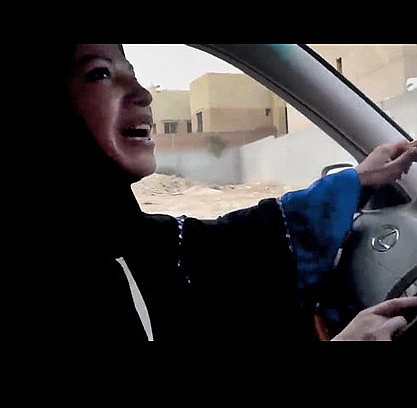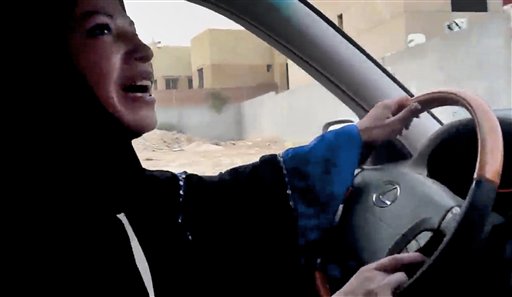DUBAI, United Arab Emirates - It's been a little more than two years since the last time women in Saudi Arabia campaigned for the right to drive. Now activists are calling for women to get behind the wheel again Saturday, and they hope reforms made by the monarchy since then have readied the deeply conservative nation for change.
The reforms made by King Abdullah in recent years have been cautious, showing his wariness of pushing too hard against influential ultraconservatives. But given the overwhelming restrictions on women in the kingdom, where the strict interpretation of Islam known as Wahhabism is effectively the law of the land, even the tiny openings have had a resounding effect.
Perhaps one sign of the impact of the changes is the loudness of the backlash by conservatives against Saturday's driving campaign.
Around 150 clerics rallied outside one of the king's palaces this week, some accusing Abdullah's top ally the United States of being behind calls to let women drive. A prominent cleric caused a stir when he said last month that medical studies show that driving a car harms a woman's ovaries. Those opposed to the campaign have also used social media to attack women activists or have urged people to harass female drivers.
The government has given mixed signals about how it will deal with the campaign, illustrated by a statement put out this week by the Interior Ministry, which is in charge of police.
The ministry warned against marches or gatherings under the pretext of the driving campaign. It said violators "disturbing public peace" will be dealt with firmly.
But activists have interpreted the statement to mean that police will crackdown on men who try and attack or harass women drivers, said Hatoon al-Fassi, a Women's History professor at King Saud University in Riyadh. She pointed out that women have made clear they aren't holding gatherings Saturday; women will simply drive in a show of defiance of the ban, perhaps on the pretext of running errands.
"We are feeling a more positive environment. There is a general atmosphere of acceptance," al-Fassi said. "The public is positive and the reactions on social media are beautiful."
Still, the statement's language also caters to conservatives because it harkens back to charges of "violating public order" that were levied against a female driver arrested in 2011.
In a sign authorities do not want the driving campaign to grow too bold, police have privately told the campaigners not to speak to the media, according to one activist who wished to remain anonymous for fear of retribution.
The driving ban -- imposed because clerics warn that "licentiousness" will spread if women drive -- is unique in the world and is the most symbolically weighty of the restrictions on women in Saudi Arabia. But it's hardly the only one.
Genders are strictly segregated, and women are required to wear a headscarf and loose, black robes in public. Guardianship laws require women to get permission from a male relative -- usually husband or father, but lacking those, a brother or son -- to travel, get married, enroll in higher education or undergo certain surgical procedures.
The first major driving protest came in 1995 and was met by a heavy response. Some 50 women who drove their cars were jailed for a day, had their passports confiscated and lost their jobs.
In June 2011, about 40 women got behind the wheel and drove in several cities in a protest sparked when a woman was arrested after posting a video of herself driving. Individual women continued to flout the ban, and one woman was arrested and sentenced to 10 lashes. The king overturned the sentence.
For Saturday, campaigners hope to bring out bigger numbers. They claim to have 16,000 signatures on a petition of support, a quarter more than in 2011. This time, they say they understand the laws better and have the full support of male relatives, and they argue public attitudes are changing.
They have posted online videos of themselves driving in recent weeks, with some showing passing male drivers giving them a thumbs-up in support. State newspapers have published articles and opinion pieces almost daily on the debate, something impossible only a few years ago.
Al-Fassi, who also writes for the state-run daily Al-Riyadh, said that two years ago she was barred from publishing an article that mentioned women's driving and had to change the wording.
"This time I wrote a long article and not a single word was changed. It is unprecedented," she said.
A string of "firsts" since the 2011 driving campaign have cracked open the door.
Women were granted the right to vote and run in the 2015 municipal elections. Thirty women were given seats on the Shura Council, an advisory body to the king and government. The largest university in the world for girls opened just a few years after the opening of the kingdom's first major mixed-gender university.
Two Saudi female athletes, including a judo player, competed in last year's Olympics. Four women were granted licenses to work as lawyers. A law criminalizing domestic abuse was introduced, with a state-backed ad campaign against abuse of women.
Still, even the changes have their limits.
While it is a crime to abuse a woman, it is not clear which agency investigates allegations and it is difficult to file a police report without a male guardian -- who could be the abuser. The new women lawyers will likely face male judges who oppose their presence in the courtroom. Despite the participation in the Olympics, there is no phys-ed for girls in public schools, and sports centers are almost entirely for men.
The municipal seats that women can now run and vote for are largely toothless. The Shura Council, still male-dominated, has so far ignored a request by three female members to discuss the issue of letting women drive. And the guardianship system is still firmly in place, a fact Amnesty International and Human Rights Watch strongly condemned this week.
Complicating matters is the vague nature of Saudi law. For example, no law directly bans women from driving. However Wahhabi clerics have issued edicts against it, which police enforce. They are backed up by the courts, where the judges are largely clerics.
"Clearly still the legal system is on the side of the men," said Karen Elliott House, author of "On Saudi Arabia: Its People, Past, Religion, Fault Lines."
This year, a court sentenced rights activist Wajeha Al-Huwaidar and another Saudi woman to 10 months in prison and slapped them with a 2-year travel ban because they helped a Canadian mother whose Saudi husband was allegedly abusive. The court charged the women with "supporting a wife without her husband's knowledge, undermining the marriage," according to Equality Now, a group advocating women's rights.
Samia El-Moslimany helped found a support network called the Waneesa Sisterhood to help women with abusive or neglectful husbands. But she says there is little her group can do with the justice system without public pressure, but the culture largely still looks down on women who go public with their cases.
"It is the stumbling block to everything, this whole warped honor-thing that society has," she said.

